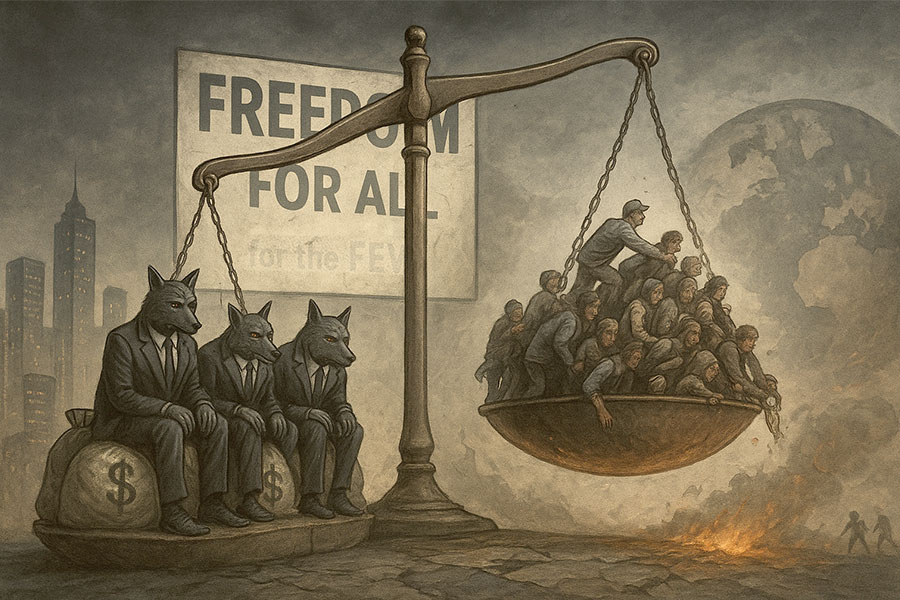
Radar | Mar 27,2021
Jun 17 , 2023
By Dani Rodrik
Worries about the inadequacies of global governance and weakening multilateralism have heightened in recent years because the United States and other leading advanced economies have increasingly put their domestic agendas first. Unilateral approaches have dominated trade, industrial policies, and the climate transition. The World Trade Organization (WTO) – the crowning achievement of global governance in the hyper-globalization era we are leaving behind – has been reduced to an ineffective bystander.
Commentary on the world economy has never been short of exhortations for greater global cooperation.
"What happens anywhere affects everybody . . . so it is pretty clear that the world needs more . . . international coordination and cooperation," wrote a leading International Monetary Fund (IMF) official in 2013.
"Virtually every problem destabilising the world . . . is global in nature and can be confronted only with a coalition that is global," echoed a leading columnist in 2019.
For the globalist commentariat, this is clearly bad news. For the global economy, however, the consequences are less apparent - and could be salutary. The global economy would do fine in a world where national governments focused on their own sustainable prosperity and social cohesion. Upon closer scrutiny, the case for global economic governance turns out to be considerably weaker than is commonly presupposed.
Start from the conventional case for global cooperation. We live in an economically interconnected world, goes the usual argument. What one country does often affects others. If governments do not coordinate their policies and reach agreements on common rules, these spillovers could leave everyone worse off.
But this reasonable-sounding argument has a big hole: the mere existence of spillovers is not an adequate justification for global coordination. In the overwhelming majority of cases where economic policies generate cross-border spillovers, national governments legitimately retain full autonomy – with little apparent detriment to the world economy. Consider a government that wants to double its budget for tertiary public education or for the training of scientists and engineers.
Should other governments be allowed to object and invoke international rules to constrain or discipline the policy?
Even the most diehard globalists would consider this an absurd possibility.
But there is definitely a cross-border spillover, which could be a large one. If the policy is carried out, the home country will strengthen its comparative advantage in skill-intensive goods, harming its competitors in global markets. Because spillovers are pervasive and many domains of government policy are naturally viewed as "domestic" (as the education example indicates), they are not a good guide to where we should seek global cooperation.
Perhaps global rules should focus on policies that might be harmful to the home economy. Investing in public education would most likely benefit the domestic economy, even if it harms certain trading partners. But raising import tariffs or subsidizing certain industries would, under many circumstances, harm the domestic economy as well as trading partners.
But this approach would not produce a reliable guide, either.
Import tariffs, subsidies, and myriad other policies that might decrease efficiency under perfect market conditions can be desirable under second-best, real-world conditions to address regional unemployment or technological externalities. It is not clear that global bureaucracies would be better positioned – or viewed as more legitimate – than national policy authorities to determine the appropriateness of such policies for the home economy.
And, in any case, should democracies not be allowed to make their own mistakes?
The argument for global governance is much stronger for the rather narrow category of policies strictly "beggar-thy-neighbour" – the harm they generate abroad is a necessary precondition of the benefits produced at home. Exploiting a country's monopoly power on world markets, maintaining low capital taxes to shift paper profits from abroad, or undervaluing the domestic currency to "steal" employment from abroad are classic cases.
But such examples are few and far between. The vast majority of economic policies that produce adverse cross-border spillovers are not of the beggar-thy-neighbour type, and they would be deployed even in the absence of harm to other countries.
What about "climate protectionism," which is central to contemporary worries around unilateralism?
While US green subsidies' local-content requirements and the EU's tariffs on carbon-intensive imports have raised the ire of third countries, such concerns are misplaced. Climate change is an existential problem for the world, and addressing it is a true global public good. From a global-governance standpoint, it would be far worse if leading countries chose to free-ride on others' decarbonization policies and did not do much to address climate change.
For various, primarily domestic reasons, the US and the EU have taken significant strides toward advancing the climate transition. That is cause for celebration, not condemnation, even if they have done so unilaterally and using different instruments. Their governments' desire to keep some of the benefits at home by privileging the competitive position of domestic firms is understandable – and a small price well worth paying for the world economy as a whole.
Too many limits on national policy autonomy can also produce a backlash against the global economy. One consequence of the erosion of national sovereignty under hyper-globalization was an increase in economic anxiety and the sense of a loss of control among many citizens. These are circumstances that exacerbate xenophobia and out-group hostility. As import competition fueled job losses in many communities, voters turned to ethno-nationalist, authoritarian populists.
Governments pursuing more inclusive economic, social, and environmental agendas further benefit the world economy. Well-governed economies with widely shared prosperity are more likely to welcome expanded international trade, investment, and immigration. As economics teaches, the home economy reaps the bulk of the benefits from openness to the world economy, provided the benefits are distributed equitably.
When countries help themselves, they help the global economy.
PUBLISHED ON
Jun 17,2023 [ VOL
24 , NO
1207]


Radar | Mar 27,2021

Editorial | Feb 15,2020

News Analysis | Dec 23,2023

Viewpoints | Nov 07,2020

Fortune News | Mar 30,2024

Life Matters | Aug 14,2021

Verbatim | Oct 31,2020

Radar | Aug 03,2019

View From Arada | Oct 18,2025

Viewpoints | Nov 02,2024

Photo Gallery | 175416 Views | May 06,2019

Photo Gallery | 165636 Views | Apr 26,2019

Photo Gallery | 155973 Views | Oct 06,2021

My Opinion | 136815 Views | Aug 14,2021

Dec 22 , 2024 . By TIZITA SHEWAFERAW
Charged with transforming colossal state-owned enterprises into modern and competitiv...

Aug 18 , 2024 . By AKSAH ITALO
Although predictable Yonas Zerihun's job in the ride-hailing service is not immune to...

Jul 28 , 2024 . By TIZITA SHEWAFERAW
Unhabitual, perhaps too many, Samuel Gebreyohannes, 38, used to occasionally enjoy a couple of beers at breakfast. However, he recently swit...

Jul 13 , 2024 . By AKSAH ITALO
Investors who rely on tractors, trucks, and field vehicles for commuting, transporting commodities, and f...

Oct 18 , 2025
The political establishment, notably the ruling party and its top brass, has become p...

Oct 11 , 2025
Ladislas Farago, a roving Associated Press (AP) correspondent, arrived in Ethiopia in...

Oct 4 , 2025
Eyob Tekalegn (PhD) had been in the Governor's chair for only weeks when, on Septembe...

Sep 27 , 2025
Four years into an experiment with “shock therapy” in education, the national moo...

Oct 18 , 2025 . By NAHOM AYELE
In a sweeping reform that upends nearly a decade of uniform health insurance contribu...

Oct 18 , 2025 . By BEZAWIT HULUAGER
A bill that could transform the nutritional state sits in a limbo, even as the countr...

Oct 18 , 2025 . By SURAFEL MULUGETA
A long-planned directive to curb carbon emissions from fossil-fuel-powered vehicles h...

Oct 18 , 2025 . By BEZAWIT HULUAGER
Transaction advisors working with companies that hold over a quarter of a billion Bir...